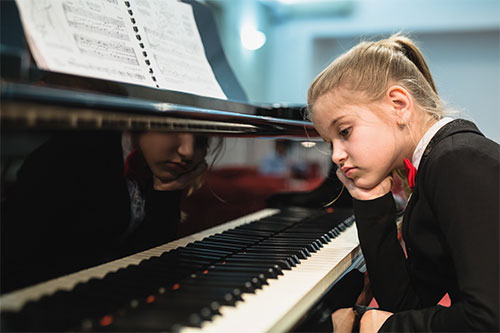Teaching Piano in 2019
Calling all piano teachers! Are piano apps trying to steal your job? Do you know how to retain students in this age of technology? Are the old ways of teaching piano dying? Traditionally, the piano industry as a whole moves very slowly, but things are starting to speed up. Here are the five top things every piano teacher should know about teaching piano in 2019!
Piano apps are a help, not a replacement!
While we were developing Piano Marvel, we decided to focus on how to help students improve the efficiency of their practice. We knew that better practice sessions would make piano lessons a better experience for everyone. Over the years, there have been massive breakthroughs with tools like the Prepare Mode, which allows students to practice at their speed with assisted feedback. Or the SASR (Standard Assessment of Sight Reading), which is the world’s first automated piano sight-reading assessment. Each new tools provide a way to work with each student’s unique needs, which is nearly impossible to accomplish with a book. Today, students are highly familiar with technology and use it for almost everything. Using Piano Marvel as part of the lesson and practice routine makes playing the piano normal again!
Motivation is “in”
To say that motivation is important is an enormous understatement. Piano teachers have to compete with all of the other opportunities that their students have these days, and it’s getting harder to keep their attention. Sports, video games, Netflix, and a whole list of other things are calling for your student’s attention. The only thing that can save your students from drowning in all of this noise is motivation. When students are highly motivated, they are willing to push everything else to the side to make time to practice. But, motivating students is much easier said than done. Though this is an entire subject on its own, I’ll summarize with these 3 points.
1. Practice should not feel overwhelming.
2. Practicing with guidance and feedback is always more efficient.
3. When learning momentum stops, so does the motivation!
Want to lose some students quickly? Give them music that they can’t play, with no guidance, and watch their momentum come to a screeching halt. Their motivation and desire to play the piano will shortly follow suit. As mentioned above, assessment and feedback during practice are highly valuable because it addresses all three of these points effectively.
Be adaptable!
Students in your neighborhood are more diverse now than ever before. This means that we, as piano teachers need to respect and acknowledge these differences. Gone are the days when teachers could demand results and rule with an iron fist! This is one of those old ideas that many piano teachers are still clinching to as they watch their enrollment decline year after year. We tend to keep these old ideas, almost like an old family tradition, that doesn’t make sense. Take the advice of Elsa from the movie Frozen and “Let it Go!” Nearly every industry on the planet has completely changed over the past 100 years. Engineering, computer science, medicine, transportation, and communication are just a few. How much has the piano industry as a whole changed in comparison within the same time frame? (Hint: Very little!)
Be Uplifting
I’m not saying every kid should get a participation trophy here. But, students benefit significantly from positive feedback, acknowledgment, and encouragement. “Don’t treat people how you see them today. Treat them how you want them to become.” When giving instructions, I love following the PCP formula (Praise, Correct, Praise). When you need to help a student make a correction, start with some encouragement like, “That was good, but I know you can do better.” Follow it up with the correction or instruction the student needs to fix the issue. Lastly, give one more simple encouragement such as, “I can tell you’ll pick this up quickly.” When the student no longer feels threatened by judgment, they will have 100 times the focus and feel good about all at the same time.
Don’t explain things to death!
Coaching many teachers over the years, I’ve seen that there is another old idea that infects all aspects of education. It is the overwhelming desire that many teachers have to spew all of their knowledge out like an erupting volcano! The thing is if students don’t have any context to hold onto, explaining music theory to them might as well be Greek. Students will pick up on new concepts much faster if they first have gained experience, and experience comes from doing, not listening. It’s like the toddler who wants to touch the hot flame of a candle. You can tell them, “Don’t touch!” One hundred times and they still want to touch it. But, once they have touched the flame, they now have context.

Joel Shifflet
Music Technology, Teacher, Trainer & Clinician





